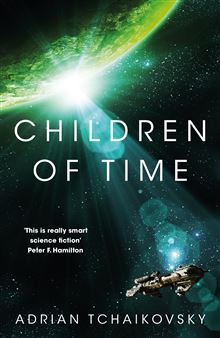Review: Adrian Tchaikovsky’s “Children of Time”
by Miles Raymer
Adrian Tchaikovky’s Children of Time is a tremendously fun and intelligent work of science fiction. Set in the far future, it is a tale of collision between two radically distinct but inextricably connected species. The first of these creeps into existence when a megalomaniacal scientist’s pet project––a re-staging of human evolution including a newly-terraformed planet, a barrel full of apes, and a specially-crafted nanovirus––is sabotaged. The nanovirus begins to work its magic on spiders instead of its intended simian hosts, resulting in large arachnids that possess human-level intelligence.
Far away in both time and space, an arkship called the Gilgamesh cruises toward a possibly-hospitable planet left behind by the “Old Empire” that devastated Earth’s ecosystem. The Gilgamesh is packed with human refugees in cold storage, and is managed by Key Crew, a select group of scientists, engineers, strategists, security professionals, and a “classicist” named Holsten Mason. Mason is a middle-aged academic who specializes in the languages and history of the Old Empire, and it is through his eyes that we learn about this desperate band of humans and their interstellar plight.
From this excellent premise, Tchaikovsky spins an elegant narrative web. In alternating chapters, we observe increasingly complex descriptions of how the spider society evolves over thousands of years, developing from primitive cooperative hunters to technologically-sophisticated inhabitants of urban mega-nests. During those same millennia, Holsten gets pulled out of cold storage and then re-iced in a series of increasingly-traumatic glimpses of what the Gilgamesh’s crew must undergo to keep the arkship viable. After a brief and violent encounter with spider society, the Gilgamesh is forced to retreat from its intended berth, but limps away with every intention to return and claim the planet as humanity’s best hope for continued survival.
There’s a lot to laud in Children of Time. Tchaikovsky’s understanding of spider morphology and sensory experience is enthralling, as are his descriptions of nanovirus-infected ants, which the spiders learn to utilize as a biotechnological means of advancing their civilization. There is excellent commentary on the nature of religion, including the curious question of how a society would be affected if its long-sought Creator God suddenly began talking to it from a satellite. We also get to explore a sexist society in which males are subordinate to females, including how the cooperative instincts built into the nanovirus encourage the spiders to question and eventually revise these brutal traditions.
As for the humans, I was worried at first that they’d turn out to be less interesting than their eight-legged counterparts. Happily, this proved not to be the case. The members of Key Crew become much more interesting as time weathers them, and Holsten’s relationship with Lain, the head engineer, becomes downright touching toward the end. These poor people, threatened by extinction at every turn, claw their way through eons of difficult decision-making, forming and breaking alliances in a fashion as depressing as it is believable. Tchaikovsky’s view of humanity is quite harsh in general, but not so much that he extinguishes any possibility of redemption.
Children of Time’s best quality is that it pays proper tribute to the universe’s only true god: time itself. Tchaikovsky’s ability to imagine how the workings of evolution might play out is impressive and engrossing, and he includes a clever conceit that allows the reader to follow the same spider characters over countless generations. He also displays an intimate understanding of how the human mind might react to unnaturally long timespans hyper-condensed into a few experiential snapshots:
It had been too much. He, who had translated the madness of a millennia-old guardian angel. He who had been abducted. He who had seen an alien world crawling with earthly horrors. He had feared. He had loved. He had met a man who wanted to be God. He had seen death.
It had been a rough few weeks. The universe had been given centuries to absorb the shock, but not him. He had been woken and pounded, woken and pounded, and the rigid stasis of suspension offered him no capacity to recover his balance. (loc. 5124-30)
Children of Time’s ending is both surprising and fitting, with a whole new adventure seemingly on the horizon. Fortunately for me, Children of Ruin was released earlier this year. I’m going to jump right in!
Rating: 8/10
